From the Creation of our present world -
in the morning after Vega had culminated (at 21h) - to the
morning when Vega was at the right
ascension line of the rising Sun there were
365 + 361 (= 726, December 27) - 590 (= 365
+ 225, August 13) = 229 days, equal in
number to the glyphs on side a of the G
tablet:
|
CLOSE TO THE FULL
MOON: |
|
DEC 7 (*261) |
8 |
9 (7 * 7 * 7) |
10 |
11 (345) |
12 (*266) |
 |
 |
 |
 |
 |
 |
|
Gb2-6 (9 * 29) |
Gb2-7 |
Gb2-8 |
Gb2-9 (35) |
Gb2-10 |
Gb2-11
(266) |
|
BUNDA (Foundation) / KAKKAB
NAMMAΧ (Star of Mighty Destiny) |
θ Piscis Austrini (330.1), λ
Oct. (330.7) |
|
Al Sa'd al Su'ud-22 (Luckiest of
the Lucky) /
Emptiness-11 (Rat)
TSIN = 36 Capricorni
(325.2),
ALPHIRK (The Flock) =
β
Cephei
(325.7),
SADALSUD =
β
Aquarii,
ξ
Gruis (325.9) |
No star listed (326) |
CASTRA = ε Capricorni
(327.2),
BUNDA = ξ Aquarii
(327.5)
SIRIUS (α Canis Majoris)
|
Mahar sha hi-na
Shahū-26 (Western One in the
Tail of the Goat)
NASHIRA
=
γ
Capricorni
(328.0),
ν
Oct. (328.3),
AZELFAFAGE
=
π¹
Cygni,
κ
Capricorni (328.7) |
Arkat sha hi-na
Shahū-27 (Eastern One in the
Tail of the Goat)
ENIF (The Nose) =
ε
Pegasi, ERAKIS =
μ
Cephei
(329.2),
46 CAPRICORNI,
JIH (the Sun) =
κ
Pegasi
(329.3),
ι
Piscis Austrini (329.4),
λ
Capricorni (329.6),
ν
Cephei (329.7),
DENEB ALGIEDI =
δ
Capricorni
(329.8)
*288.0 = *329.4 - *41.4 |
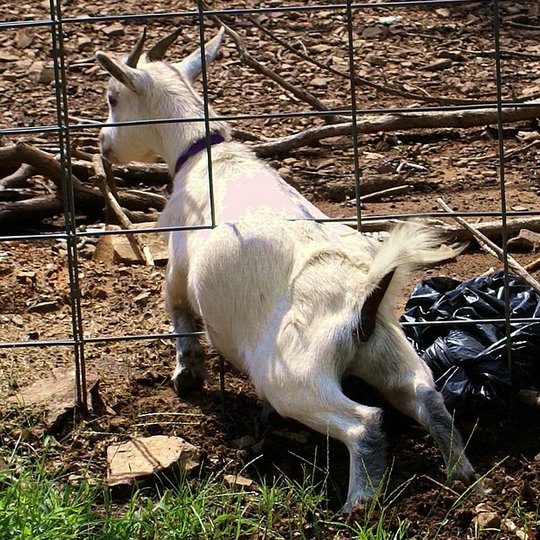 |
|
Febr 9 (40) |
10 |
(343 + 64) |
(408 = 43 + 365) |
13 |
All Hearts' Day |
|
... On
February 9 the Chorti Ah K'in,
'diviners', begin the
agricultural year. Both the
260-day cycle and the solar year
are used in setting dates for
religious and agricultural
ceremonies, especially when
those rituals fall at the same
time in both calendars. The
ceremony begins when the
diviners go to a sacred spring
where they choose five stones
with the proper shape and color.
These stones will mark the five
positions of the sacred
cosmogram created by the ritual.
When the stones are brought back
to the ceremonial house, two
diviners start the ritual by
placing the stones on a table in
a careful pattern that
reproduces the schematic of the
universe. At the same time,
helpers under the table replace
last year's diagram with the new
one. They believe that by
placing the cosmic diagram under
the base of God at the center of
the world they demonstrate that
God dominates the universe. The
priests place the stones in a
very particular order. First the
stone that corresponds to the
sun in the eastern, sunrise
position of summer solstice is
set down; then the stone
corresponding to the western,
sunset position of the same
solstice. This is followed by
stones representing the western,
sunset position of the winter
solstice, then its eastern,
sunrise position. Together these
four stones form a square. They
sit at the four corners of the
square just as we saw in the
Creation story from the Classic
period and in the Popol Vuh.
Finally, the center stone is
placed to form the ancient
five-point sign modern
researchers called the quincunx
...

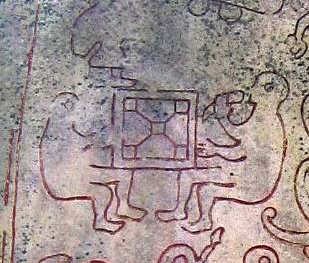
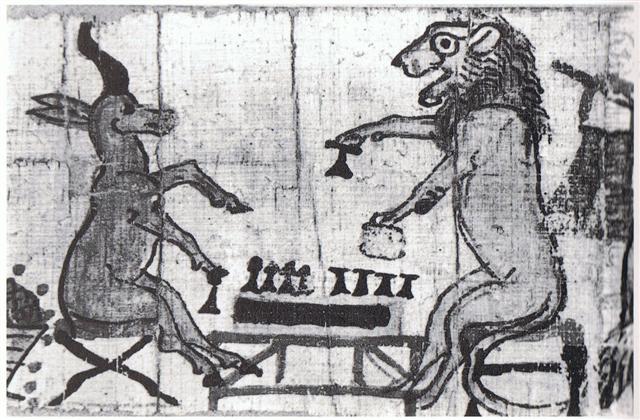 |
|
°Febr 5 |
6 |
7 |
8 (*324) |
9 |
10 (41) |
|
'Jan 13 (378) |
14 |
15 (*300) |
16 |
17 |
18 (383) |
|
"Dec 30 |
31 |
"Jan 1 |
2 |
3 (368) |
4 |
|
CLOSE TO THE SUN: |
|
JUNE 7 (*78) |
8 |
9 |
10 (161) |
11 |
12 |
|
Fibonacci: 1, 1, 2, 3, 5, 8, 13,
21, 34, 55 ... → 1.618033998 ...
= φ = (1 + √5) / 2.
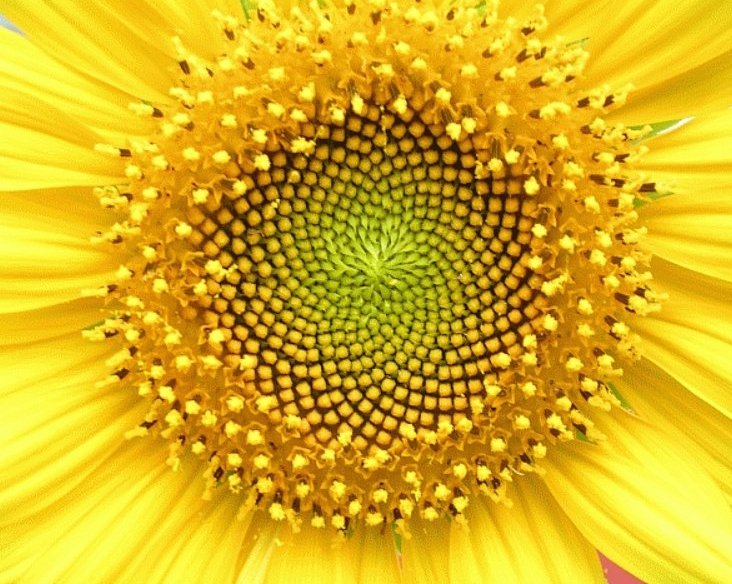
... The month, which takes its
name from Juppiter the oak-god,
begins on June 10th and ends of
July 7th. Midway comes St.
John's Day, June 24th, the day
on which the oak-king was
sacrificially burned alive. The
Celtic year was divided into two
halves with the second half
beginning in July, apparently
after a seven-day wake, or
funeral feast, in the oak-king's
honour
...
.jpg) |
|
The Knot (Ukdah) |
5 Imix 9 Kumk'u
Rishu A.-13 (Head of the Lion)
ψ Leonis (146.4),
RAS ELASET AUSTRALIS = ε Leonis
(146.6)
*105.0 = *146.4 - *41.4 |
VATHORZ PRIOR = υ Carinae
(147.9) |
|
Star-25 (Horse) /
ANA-HEU-HEU-PO-5 (Pillar where
debates were held)
ALPHARD (The Horse)
=
α
Hydrae
(142.3),
ω
Leonis (142.6),
τ¹
Hydrae (142.7) |
Al Tarf-7 (The End)
ψ
Velorum (143.3),
ALTERF =
λ
Leonis,
τ²
Hydrae (143.4),
ξ
Leonis (143.5)
*102.0 = *143.4 - *41.4 |
A Hydrae
(144.1)
VEGA (α Lyrae)
|
Creation of our present world
UKDAH (Knot) =
ι
Hydrae
(145.4),
κ
Hydrae (145.5),
SUBRA =
ο
Leonis
(145.8)
*104.0 = *145.4 - *41.4
ALPHEKKA MERIDIANA |
|
Aug 10 |
11 |
12 |
13 (*145) |
14 |
15 (227) |
|
°Aug 6 |
7 |
8 (220) |
9 |
10 |
11 (*143) |
|
'July 14 |
15 |
16 |
17 (*118) |
18 |
19 (200) |
|
"June 30 |
"July 1 |
2 |
3 (*104) |
4 |
5 (186) |
|
Itzam-Yeh defeated |
28
May (148), 3149 BC |
|
1st
3-stone place |
21
May (141), 3114 BC |
|
Creation of our
present world |
13
August (225), 3114
BC |
|
Och
ta chan (Hun-Nal-Ye
'entered or became
the sky') |
5
February (36), 3112
BC |
|
21
May, 3114 BC - 5
February, 3112 BC =
542 |
|
542
'happens to be' the
sum of 365 days and
6 * 29½ nights. |
.. In three
magnificent texts at the
site of Koba, scribes
recorded it as one of the
largest finite numbers we
humans have ever written.
According to these
inscriptions, our world was
created on the day 4 Ahaw
8 Kumk'u. On this day
all the cycles of the Maya
calendar above twenty years
were set at thirteen - that
is to say, the cycles of 400
years, 8,000 years, 160,000
years, 32,000,000 years, and
so on, all the way up to a
cycle number extending to
twenty places (2021
* 1360-day year).
In our
calendar, this day fell on
August 13, 3114 BC. To
understand what this means,
we need a little scale. The
thirteens in this huge
number act like the twelve
in our cycles - the next
hour after twelve is one.
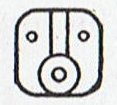
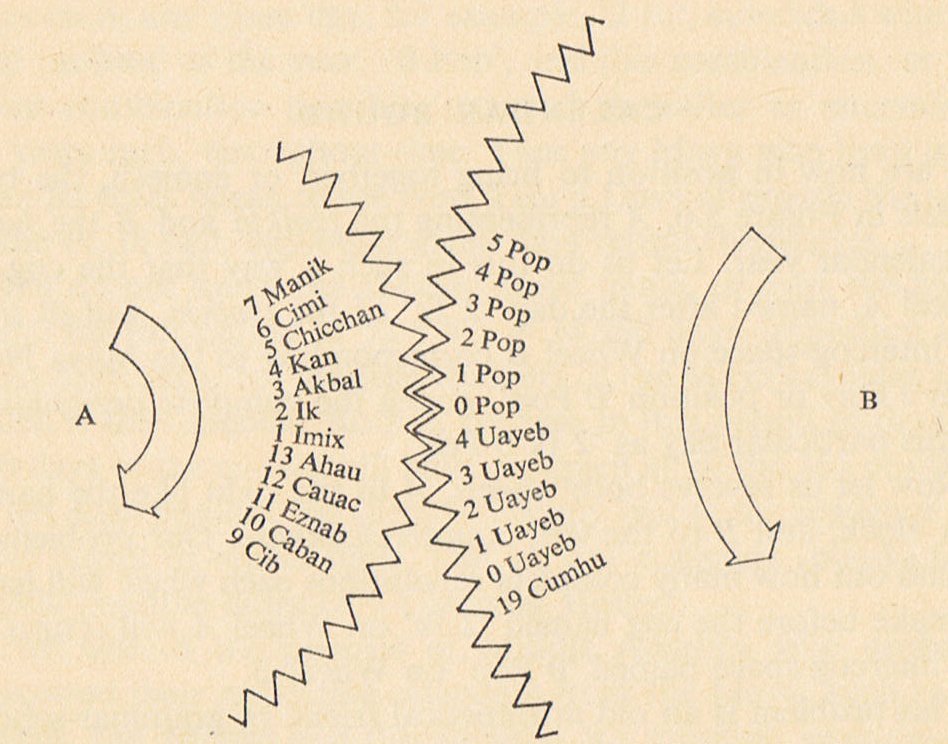
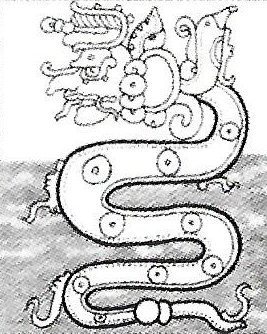
Thirteen
changed to one as each of
these cycles in the Maya
calendar was completed,
therefore, we have the
following sequence:
|
13. |
13. |
13. |
0. |
0. |
0. |
1. |
5
Imix |
9
Kumk'u |
(Aug. 14, 3114
B.C.) |
|
13. |
13. |
13. |
0. |
0. |
1. |
0. |
11 Ahaw |
3
Pop |
(Sept. 2, 3114
B.C.) |
|
13. |
13. |
13. |
0. |
1. |
0. |
0. |
13 Ahaw |
3
Kumk'u |
(Aug.7, 3113
B.C.) |
|
13. |
13. |
13. |
1. |
0. |
0. |
0. |
2
Ahaw |
8
Mak |
(May 1, 3094
B.C.) |
|
13. |
13. |
1. |
0. |
0. |
0. |
0. |
3
Ahaw |
13 Ch'en |
(Nov. 15, 2720
B.C.) |
|
13. |
13. |
13. |
0. |
0. |
0. |
0. |
4
Ahaw |
3
K'ank'in |
(Dec. 23, A.D.
2012) |
|
13. |
1. |
0. |
0. |
0. |
0. |
0. |
10 Ahaw |
13 Yaxk'in |
(Oct. 15, A.D.
4772) |
|
1. |
0. |
0. |
0. |
0. |
0. |
0. |
7
Ahaw |
3
Zotz' |
(Nov. 22, A.D.
154587) |
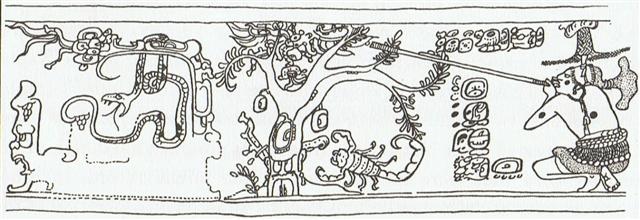
...
This pot depicts one of
the Hero Twins (One-Ahaw
in the Classic texts and
One-Hunaphu in the
K'iche' Popol Vuh) and a
great bird who is trying
to land in a huge ceiba
tree heavy with fruit.
This mythical bird is
Itzam-Yeh, Classic
prototype of
Wuqub-Kaqix,
'Seven-Macaw', of Popol
Vuh fame. In that story,
in the time before the
sky was lifted up to
make room for the light,
the vainglorious
Seven-Macaw imagined
himself to be the sun.
Offended by his pride,
the Hero Twins humbled
him by breaking his
beautiful shining tooth
with a pellet from their
blowgun. This pot shows
One-Ahaw aiming at the
bird as he swoops down
to land in his tree. As
Itzam-Yeh lands
on his perch, the text
tells us he is 'entering
or becoming the sky'.
This particular
'sky-entering' is not
the one mentioned in the
Palenque text. It is the
final event that
occurred in the previous
creation before the
universe was remade.
Before the sky could be
raised and the real sun
revealed in all its
splendor, the Hero Twins
had to put the false
sun, Itzam-Yeh,
in his place. If the
date on this pot
corresponds to that
pre-Columbian event, as
we believe it does, then
Itzam-Yeh was
defeated on
12.18.4.5.0.1 Ahaw
3 K'ank'in (May
28, 3149 B.C.). After
the new universe was
finally brought into
existence, First Father
also entered the sky by
landing in the tree,
just as Itzam-Yeh
did ...
|
|
56
|
8 |
65 = 361 - 296 |
|
|
OCT 16 (289) |
5.0 |
OCT 21 (*214) |
2 |
Oct 24 ('217) |
6 |
OCT 31 (*224) |
NOV 1 (305) |
56 |
DEC 28 (362) |
|
 |
 |
 |
 |
 |
 |
|
Ga8-6 (209) |
Ga8-11 (214) |
Ga8-14 (217) |
Ga8-21 (224) |
Ga8-22 (225) |
Gb2-27 (282) |
|
18h (*273.4) |
ξ
Pavonis (*278.4) |
VEGA |
NUNKI (*288.4) |
τ
Sagittarii
|
*346 |
|
Dec 19 (353) |
X-MAS EVE (358) |
Dec 27 (19 * 19 = 361) |
Jan 3 (368) |
19h (*289.4) |
March 2 (61) |
|
73 = 361 - 288 |
|
The numbers indicate that we might have
found the
basic solution to the problem of how to read
the stars in the night (according to the
current creation).
|
VEGA |
|
Culmination |
135 |
Heliacal |
227 |
|
Aug 13 |
Dec 27 |
|
225 |
361 |
|
590 = 225 +
365 |
726 = 361 + 365 |
|
364 |
The star culminations at 21h are in the
night half of the the diurnal cycle, i.e. those nights
which will precide the rising Sun.
... Allen has
documented all his star culminations at
21h, which could be due to an effort of
keeping the culminations at their proper
places according to the ancients, 24h
(spring equinox) - 21h = 3h = 24h / 8 =
45º. 3h corresponds to 366 / 8 = 45.75
of my right ascension days and *366 -
*46 = *320 (Dramasa, σ
Octantis) ...
The number of glyphs on side a of the G
tablet is 229 and we can now perceive
this number as corresponding to the difference between
when Vega rose with the Sun and when
Vega culminated at 21h.
Because 365 = 136 (→
The Foundation Stone Alcyone in the Pleiades)
was followed by
229 (= 183 + 46).
Furthermore,
Atlas culminated (at 21h) in December 31
(365) and rose heliacally in May 15 (135
= 500).

... A sidelight
falls upon the notions connected with
the stag by Horapollo's statement
concerning the Egyptian writing of 'A
long space of time: A Stag's horns grow
out each year. A picture of them means a
long space of time.' Chairemon
(hieroglyph no. 15, quoted by Tzetzes)
made it shorter: 'eniautos: elaphos'.
Louis Keimer, stressing the absence of
stags in Egypt, pointed to the Oryx (Capra
Nubiana) as the appropriate
'ersatz', whose head was, indeed, used
for writing the word rnp = year,
eventually in 'the Lord of the Year', a
well-known title of Ptah. Rare as this
modus of writing the word seems to have
been - the Wörterbuch der
Aegyptischen Sprache (eds. Erman and
Grapow), vol. 2, pp. 429-33, does not
even mention this variant - it is worth
considering (as in every subject dealt
with by Keimer), the more so as
Chairemon continues his list by offering
as number 16: 'eniautos: phoinix',
i.e., a different span of time, the
much-discussed 'Phoenix-period' (ca. 500
years) ...
... Gronw Pebyr, who
figures as the lord of Penllyn - 'Lord
of the Lake' - which was also the title
of Tegid Voel, Cerridwen's husband, is
really Llew's twin and tanist ... Gronw
reigns during the second half of the
year, after Llew's sacrificial murder;
and the weary stag whom he kills and
flays outside Llew's castle stands for
Llew himself (a 'stag of seven fights').
This constant shift in symbolic values
makes the allegory difficult for the
prose-minded reader to follow, but to
the poet who remembers the fate of the
pastoral Hercules the sense is clear:
after despatching Llew with the dart
hurled at him from Bryn Kyvergyr, Gronw
flays him, cuts him to pieces and
distributes the pieces among his
merry-men. The clue is given in the
phrase 'baiting his dogs'. Math had
similarly made a stag of his rival
Gilvaethwy, earlier in the story. It
seems likely that Llew's mediaeval
successor, Red Robin Hood, was also once
worshipped as a stag. His presence at
the Abbot's Bromley Horn Dance would be
difficult to account for otherwise, and
stag's horn moss is sometimes called
Robin Hood's Hatband. In May, the stag
puts on his red summer coat. Llew visits
the Castle of Arianrhod in a coracle of
weed and sedge. The coracle is the same
old harvest basket in which nearly every
antique Sun-god makes his New Year
voyage; and the virgin princess, his
mother, is always waiting to greet him
on the bank ...

|
71 |
CLOSE TO THE
FULL MOON: |
|
MARCH 10 (*354) |
11 (15
* 29) |
12 (436) |
13 (72) |
 |
 |
 |
 |
|
Gb5-1 (354 = 12 * 29½) |
Gb5-2 |
Gb5-3 |
Gb5-4
(128) |
|
ψ
Persei (53.1)
ACRUX (α
CRUCIS) |
δ Persei (54.7) |
Al Thurayya-27 (Many Little
Ones) /
Krittikā-3 (Nurses of
Kārttikeya) /
TAU-ONO (Six Stones)
ATIKS = ο Persei, RANA
(Frog) = δ Eridani (55.1),
CELAENO (16 Tauri), ELECTRA
(17), TAYGETA (19), ν Persei
(55.3), MAIA (20), ASTEROPE
(21), MEROPE (23)
(55.6) |
Hairy Head-18 (Cockerel) /
Temennu-3 (Foundation Stone)
ALCYONE
(56.1),
PLEIONE (28 Tauri), ATLAS
(27 Tauri)
(56.3) |
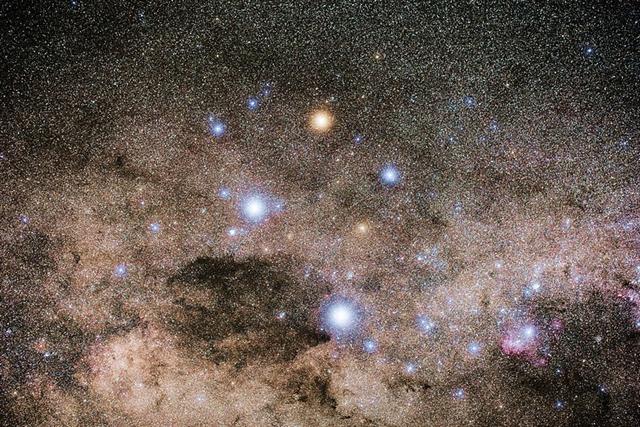 |
|
May 13 (*53) |
14 |
15 (500) |
16 (136) |
|
CLOSE TO THE SUN: |
|
SEPT 8 |
9 (*172) |
10 |
11
(254) |
|
θ Cor. Borealis (235.3), γ
Lupi (235.6),
GEMMA = α Cor. Bor., ZUBEN
ELAKRAB = γ Librae, QIN = δ
Serpentis, ε Tr. Austr.
(235.7), μ Cor. Borealis
(235.8), υ Librae (235.9)
SIRRAH (α Andromedae |
φ Bootis (236.2), ω Lupi, τ
Librae (236.3), ψ¹ Lupi
(236.7), ζ Cor. Borealis
(236.9) |
κ
Librae (237.2),
ι Serpentis (237.4),
ψ²
Lupi,
ρ
Oct.
(237.5), γ Cor. Borealis, η
Librae (237.7),
COR SERPENTIS = α Serpentis
(237.9)
*196.0 = *237.4 - *41.4 |
π
Cor. Borealis,
UNUK ELHAIA (Necks of the
Serpents) =
λ
Serpentis
(238.1),
CHOW =
β
Serpentis
(238.6) |
|
... In other words, the
ancient Druidic religion
based on the oak-cult will
be swept away by
Christianity and the door -
the god Llyr - will languish
forgotten in the Castle of
Arianrhod, the Corona
Borealis. This helps us
to understand the
relationship at Rome of
Janus and the White Goddess
Cardea who is ... the
Goddess of Hinges who came
to Rome from Alba Longa. She
was the hinge on which the
year swung - the ancient
Latin, not the Etruscan year
- and her importance as such
is recorded in the Latin
adjective cardinalis
- as we say in English 'of
cardinal importance - which
was also applied to the four
main winds; for winds were
considered as under the sole
direction of the Great
Goddess until Classical
times ... |
|
Nov 11
(315) |
12 (*236) |
13 |
14 |
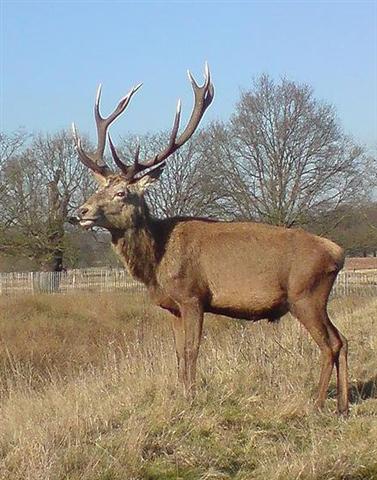
|






.jpg)











